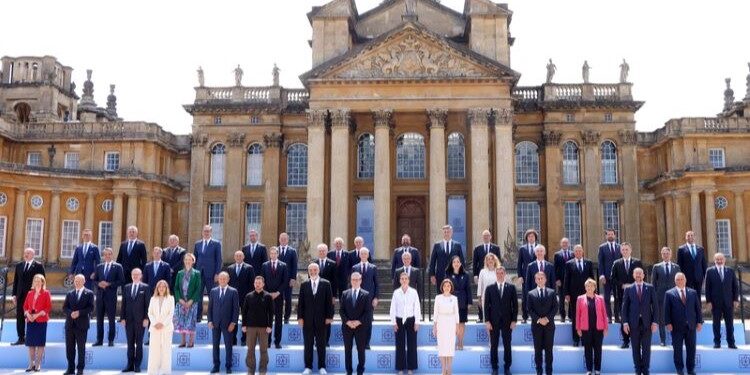Eduardo González
The more than forty leaders gathered yesterday at the fourth summit of the European Political Community (EPC), have committed to continue helping Ukraine "for as long as necessary", including supporting this country's energy needs in the face of the winter. During his speech, the President of the Government, Pedro Sánchez, warned against the “subtle threats” that democracies face, such as the spread of fake news and disinformation.
The summit, held at Blenheim Palace, in Woodstock (Oxfordshire), was attended by 43 heads of State and Government, as well as EU institutions. They included the leaders of 24 EU Member States and other European nations, including Albania, Andorra, Armenia, Azerbaijan, Bosnia and Herzegovina, Georgia, Iceland, Kosovo, Liechtenstein, Moldova, Monaco, Montenegro, North Macedonia, Norway, San Marino, Serbia, Switzerland, Turkey, Ukraine and the United Kingdom.
On behalf of the EU, the still president of the European Council, Charles Michel, attended. The president of the European Commission, Ursula von der Leyen, could not participate because the meeting coincided with the vote in the European Parliament for her re-election to office. As at the previous EPC meeting, held in October 2023 in Grenada, the President of Turkey, Recep Tayyip Erdogan, was also not present.
At the final press conference, British Prime Minister Keir Starmer assured that the EPC summit had been “very fruitful and productive” and European leaders had committed to “remain united with Ukraine” and to continue helping this country. “as long as it takes”, a commitment that, he assured, will include support for Kyiv's energy needs for the winter. “Together we work for the security of our continent,” declared Charles Michel in relation to the results of the summit.
Starmer and Zelensky
Hours earlier, in his speech opening the summit, Keir Starmer himself proclaimed the “reset” of relations between the United Kingdom and the European Union (EU) under the new Labor Government. “The United Kingdom and the European Union, working together, are a powerful force for good,” he proclaimed.
One of the most anticipated interventions at the summit was that of the president of Ukraine, Volodymyr Zelensky, who thanked the countries that are supporting his country to enter the European Union (“this shows that, even in the most difficult circumstances, the EU can keep its promises”) and in NATO, as well as those who helped organize the first Ukraine Peace Summit, which “was a success for all those who want a just end to this war.”
According to Zelensky, Russian President Vladimir Putin has not only “failed in his main objective,” but has also “failed to create division in Europe.” Putin has sacrificed “tens of thousands of his citizens but has achieved nothing significant,” thanks to “the bravery of our warriors and the bravery of our partners,” he said.
He also urged European leaders to show “collective will” to stop Putin and shoot down Russian missiles, drones and planes, because “the more effective our air defenses are, the more defenseless Putin will be and the more likely Russia will seek peace.” “More Russian missile launch sites targeting Ukrainian civilians will be destroyed and more of their ability to continue the war will be destroyed,” he added.
Pedro Sánchez
For his part, the President of the Government, Pedro Sánchez, reiterated his unwavering support for Ukraine and President Zelensky and called for a positive discourse on immigration matters and the need to address this issue through interterritorial solidarity and in a humane manner.
The head of the Executive participated in the working group on disinformation and the defense of democracies, chaired by Charles Michel and the President of Montenegro, Jakov Milatović. During his speech, Pedro Sánchez warned of the need to defend democratic values and institutions in the face of the risks and “subtle threats” that democracies face, such as the spread of fake news and misinformation, and highlighted the Democratic Action Plan, presented yesterday in the Congress of Deputies, which "is in line with the European Commission and with the latest EU regulation on freedom and pluralism in the media."
At the end of the closing plenary session, the European leaders participating in the summit of the European Political Community attended a reception hosted by King Charles III.
Today was the fourth meeting of the EPC, an initiative launched by the President of France, Emmanuel Macron, during the French presidency of the Council of the EU. At the first meeting, held in October 2022, the leaders mainly discussed issues related to peace and security, especially Russia's war in Ukraine, and the energy crisis.
At the next meeting, held in June 2023, they discussed joint efforts for peace and security, energy resilience, and connectivity and mobility in Europe. At the third, held in Grenada in October 2023, leaders discussed how to make Europe more resilient, prosperous and geostrategic.
...






